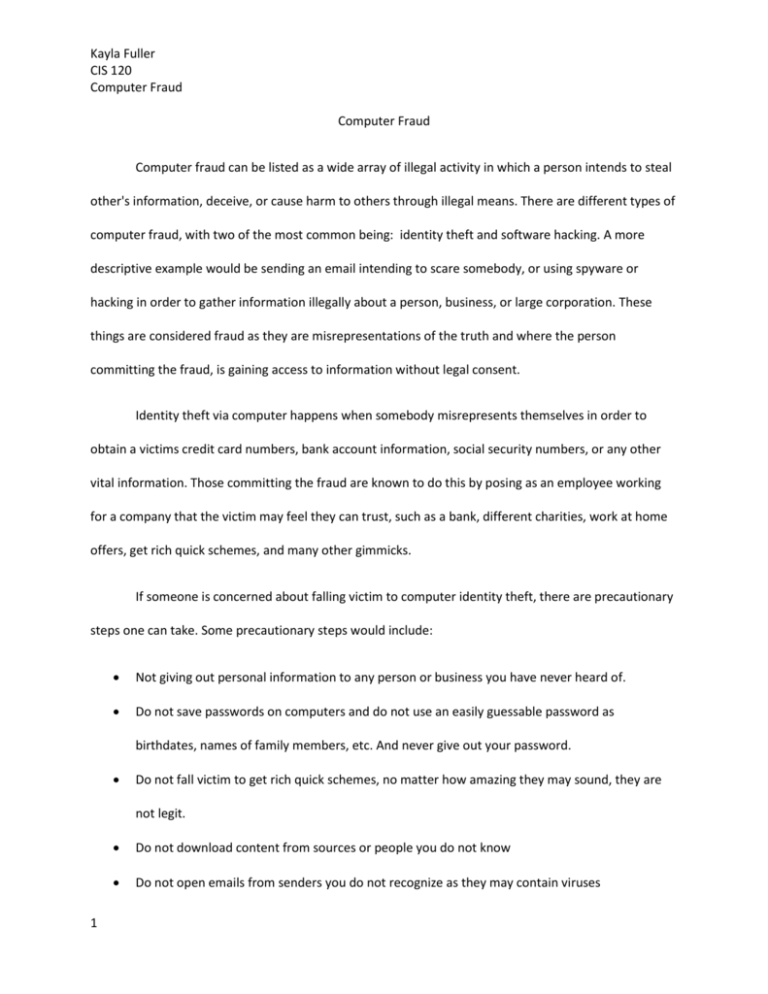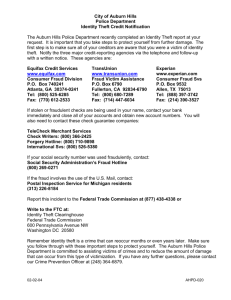File - My CIS 120 Learning Experience
advertisement

Kayla Fuller CIS 120 Computer Fraud Computer Fraud Computer fraud can be listed as a wide array of illegal activity in which a person intends to steal other's information, deceive, or cause harm to others through illegal means. There are different types of computer fraud, with two of the most common being: identity theft and software hacking. A more descriptive example would be sending an email intending to scare somebody, or using spyware or hacking in order to gather information illegally about a person, business, or large corporation. These things are considered fraud as they are misrepresentations of the truth and where the person committing the fraud, is gaining access to information without legal consent. Identity theft via computer happens when somebody misrepresents themselves in order to obtain a victims credit card numbers, bank account information, social security numbers, or any other vital information. Those committing the fraud are known to do this by posing as an employee working for a company that the victim may feel they can trust, such as a bank, different charities, work at home offers, get rich quick schemes, and many other gimmicks. If someone is concerned about falling victim to computer identity theft, there are precautionary steps one can take. Some precautionary steps would include: Not giving out personal information to any person or business you have never heard of. Do not save passwords on computers and do not use an easily guessable password as birthdates, names of family members, etc. And never give out your password. Do not fall victim to get rich quick schemes, no matter how amazing they may sound, they are not legit. 1 Do not download content from sources or people you do not know Do not open emails from senders you do not recognize as they may contain viruses Kayla Fuller CIS 120 Computer Fraud Person's committing computer fraud, can mainly be classified as hackers. A hacker is someone who seeks or exploits weaknesses in a computer's system or network in order to gain profit, to protest, to seek information, or just for a challenge. These computer hackers have a variety of techniques. The follow table will illustrate these techniques and also explain what they are and how they are used. Computer Hacker Techniques Term Definition Password Cracking Process of recovering passwords from data that has been stored or transmitted in a computer system. A self-replicating program that spreads by inserting copies of itself into codes or documents. Some viruses are harmless but most are malicious. A tool designed to record every keystroke on an affected machine for later retrieval. Allows user to gain access to confidential information typed onto the targeted machine. Computer Virus Key Loggers With the knowledge of the types of computer fraud, identity theft, and hackers, spending time online shopping, banking, or partaking in social media may sound unappealing. As long as you take precautionary steps towards protecting your computer with proper anti-virus software, and take steps towards securing your passwords and other personal information, hackers and identity thief's will have one less victim. 2 Kayla Fuller CIS 120 Computer Fraud Annotated Bibliography 1. http://www.wisegeek.org/what-are-the-different-types-of-computer-fraud.htm I really enjoyed this site, found a lot of useful information I was able to incorporate. 2. http://www.wisegeek.org/what-is-computer-fraud.htm This is the same site as above but to a different like I had used. I found this link to be much more informative and helpful. 3. http://en.wikipedia.org/wiki/Hacker_(computer_security) I try not to use Wikipedia as it's difficult for me to read and follow at times. But for this, I found the types of hacking I used for my table, to be very useful and interesting. I had no idea about the different types before reading. 3




